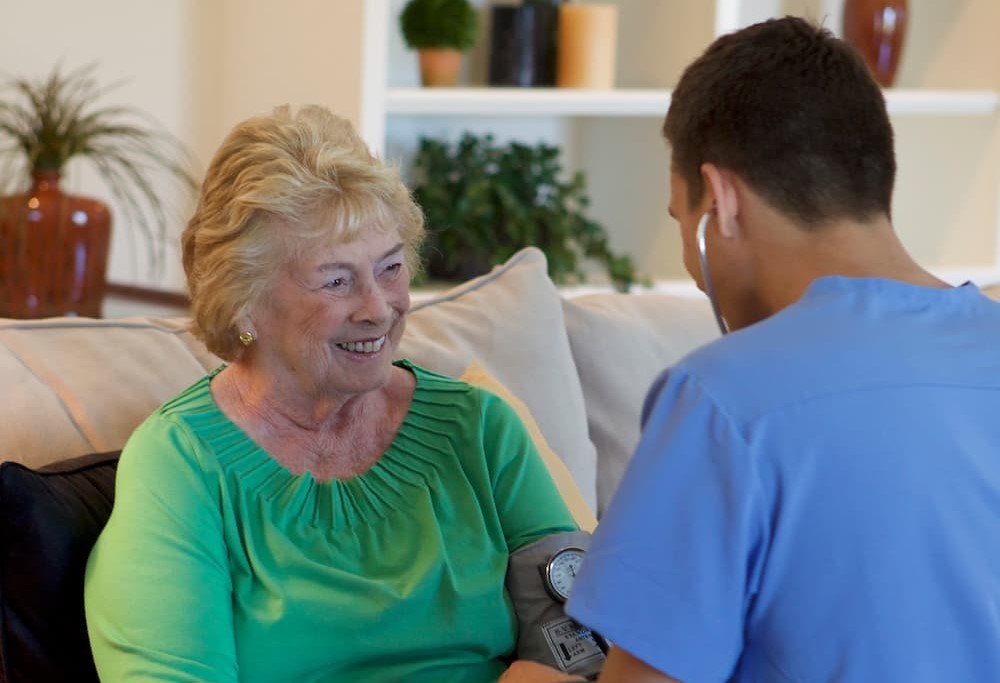
Many consider February as the month to reflect on the love in their lives, but it’s also the time to take a beat for cardiovascular health. American Heart Month is an opportunity to build awareness around healthy living and heart health in seniors.
As we age, the risk of heart disease and stroke increases. Cardiovascular disease is a leading cause of death in older adults, so maintaining heart health is crucial in reducing the risk of these conditions and improving overall health. Healthy hearts also allow for increased physical activity and energy levels, which help seniors stay more active, be more independent, and have the ability to engage in meaningful activities and relationships.
Maintaining heart health also can lead to a longer lifespan. Here are some lifestyle changes and healthy habits seniors can adopt to keep their hearts healthy and reduce their risk for heart disease:
- Exercise regularly: Regular physical activity, such as brisk walking, cycling, or swimming, can help improve cardiovascular fitness, reduce the risk of heart disease, and improve overall health. Aim for at least 30 minutes of moderate-intensity exercise on most days of the week.
- Eat a healthy diet: A diet low in saturated and trans fats and high in fruits, vegetables, whole grains, and lean protein can help lower the risk of heart disease. Limit the amount of salt, sugar, and processed foods in your diet.
- Quit smoking: Smoking is a major risk factor for heart disease. Smoking cessation can significantly reduce the risk of heart problems and improve overall health.
- Control blood pressure: High blood pressure and heart disease go hand-in-hand. Regular check-ups with a healthcare provider and medications, if needed, can help keep blood pressure under control.
- Manage stress: Chronic stress can contribute to heart disease. Find healthy ways to manage stress, such as exercise, meditation, or spending time with loved ones.
- Maintain a healthy weight: Being overweight or obese can lead to health problems, but maintaining a healthy weight through diet and exercise can help lower the risk.
- Get enough sleep: Lack of sleep can increase the risk of heart disease, so seniors should catch 7 to 9 hours of zzzs each night.
Following these healthy habits can improve heart health in seniors and reduce their risk of heart disease. If a heart event does occur, cardiac rehabilitation can be a valuable part of the recovery process.
WHAT IS CARDIAC REHABILITATION?
Cardiac rehabilitation plays a critical role in helping seniors recover and improve their physical and mental health after a heart event, such as a heart attack, angioplasty, bypass surgery, or heart failure. It’s a multidisciplinary program in senior care to help them reduce the risk of future heart problems, improve their overall quality of life, and return to normal activities as soon as possible.
The exercise component of cardiac rehabilitation typically includes low- to moderate-intensity aerobic activity, such as walking, cycling, or using an elliptical machine, as well as resistance training to build muscle strength and endurance. The education component of cardiac rehab may include information on healthy lifestyle changes, such as improving diet, quitting smoking, and managing stress, as well as medications and medical procedures related to heart health.
BENEFITS OF CARDIAC REHABILITATION
Cardiac rehabilitation plays a vital role in the recovery process of older adults who have experienced a heart event. Rehabilitation therapy supports senior heart health by helping reduce the risk of future heart problems and improving overall well-being. Cardiac rehab can also help older adults:
- Manage heart disease: Seniors with heart disease may choose to participate in cardiac rehabilitation as part of their management plan. The program can help reduce risk factors, such as high blood pressure, high cholesterol, and obesity.
- Improve physical function: Seniors experiencing decreased physical function or those at risk for heart disease may participate in cardiac rehabilitation to improve cardiovascular fitness, muscle strength, and endurance.
- Manage chronic conditions: Seniors with chronic conditions, such as diabetes or COPD, may opt for cardiac rehabilitation as part of their overall management plan. The program can help improve physical function and reduce the risk of complications related to these conditions.
SENIOR CARE & CARDIAC REHAB AT PREMIER PLACE
Premier Place is The Glenview at Pelican Bay’s onsite health and rehabilitation center for exceptional senior care in a comfortably elegant coastal setting. Offerings include short-term, post-acute and long-term care, and inpatient and outpatient rehabilitation therapies for complex medical conditions, including cardiac events.
Our experienced team of healthcare professionals includes nurses, therapists and aides who provide comprehensive care to Glenview residents and others needing senior care in Naples and the surrounding area. The team works closely with seniors, their families, their doctors and caregivers to ensure every healing moment matters and provide the support they need throughout their entire recovery.
Premier Place’s award-winning spa-like atmosphere, luxury amenities, spacious private suites, dynamic therapy gym, personalized treatment plans, and chef-prepared fine dining are designed to promote health and healing and help seniors get back to feeling their best as soon as possible.
Explore Premier Place online to learn more about our center’s first-class hospitality, holistic approach to health and healing, and expertise and collaboration to support exceptional care for seniors.


